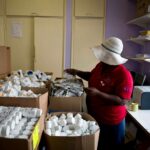Malawi prostitutes gang up to fight Aids, stigma
Published on November 18, 2012 at 1:36 PM by FACE OF MALAWI
Although they have permanent landmark in the country’s hotspots, the country has not come to terms with the fact that prostitutes are part and parcel of the community.
It is this denial, which stems from cultural stereotypes, which hinders the fight against the Aids epidemic.
Activists claim that to ignore commercial sex workers in the Aids fight is counterproductive as this group is central to the spread of the epidemic.
Last week, several NGOs implementing sex work interventions pooled together 50 commercial sex workers from across the country in a meeting where some pertinent issues were emerged.
Lorreta Mkulichi, who was elected chairperson of the National Sex Workers Alliance, noted that sex workers do not deserve the negative labels they get from the community.
Mkulichi said prostitution is work like any other profession.
“It is my body and I can choose to use it any way I like. If I choose to use my body as a business, it is anyone’s business,” she said, urging government and Parliament to formalise the trade in Malawi.
According to legal experts, sex work is not illegal in Malawi. What is illegal is living off proceeds from sex work. To what, human rights lawyer Chrispin Sibande said since the Constitution guarantees every citizen the right to association and opinion, sex workers have not broken any law by forming an alliance.
According to experts, there is high stigma and discrimination associated with the sex work.
Current legal environment against the trade and the absence of a national policy make sex work a hidden trade and often practiced undercover making it almost impossible to accurately quantify the magnitude of sex workers at any setting of Malawi society.
HIV prevalence among sex workers and their clients today is commonly 10–20- fold higher than among the general population. In Malawi, HIV prevalence among Female Sex Workers is estimated at over 70 percent. Mkulichi said making prostitution formal would help in fighting the Aids epidemic.
“If government legalised sex work, it would be easy for people to identify us because we will have IDs and that will make it easy for our clients to protect themselves when having sex with us,” she said.
“But with way things are now, one does not know who is a commercial sex worker or not and this endangers lives because some sex workers dress like office professionals and they fool many men.”
According to Mkulichi, the stigma against sex work in Malawi arises from the fact that Malawians do not like to discuss sex issues.
But she demands for Malawians to respect commercial sex workers.
“People should not discriminate against us. We are part and parcel of the community. We are citizens of Malawi, we have rights too. We have clients from across board including pastors and Police so people should not treat us like rubbish,” she said.
PaKachere Institute for Health and Development Communications is one of the NGOs that has embraced the notion of engaging sex workers in the Aids fight.
PaKachere executive director Simon Sikwese said the aim behind establishing the alliance of Female Sex Workers in Malawi is to support the on-going HIV prevention activities among most at risk populations one of which are the female sex workers.
“The alliance will provide a platform for female sex workers to come together and be actively involved in mobilising each other to take a leading role in preventing the further spread of HIV as well as claim their rights to quality health care services as well as social justice.”
According to Sikwese, in order for these services to succeed among female sex workers, the involvement of sex workers is key in halting ongoing transmission.
“The formation of this alliance will provide a platform for female sex workers to become actively involved in reducing the transmission of HIV between themselves and their clients by empowering them to know their right to health, be able to demand and access health care services freely, encourage each other to trade responsibly by among other things promote correct and consistent condom use as well as routine HIV and STI testing.
“The alliance will also provide female sex workers with a platform to prevent human rights abuse that they suffer which are perpetrated by clients and sometimes law enforcers.”
Some of the partners involved in the initiative include: Theatre for A Change, Focus (Karonga), Yoneco (Zomba), FPAM (Lilongwe), SWAM (Mchinji), Naso Nkhotakota), Red Cross (Mwanza), Samal (Salima) and CEGI (Mzuzu).


